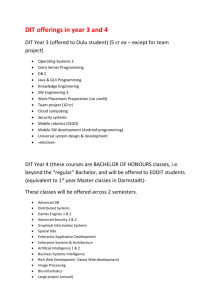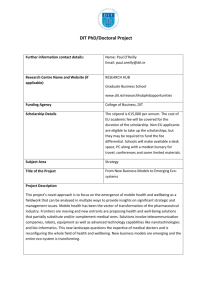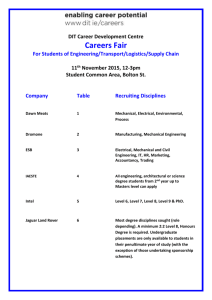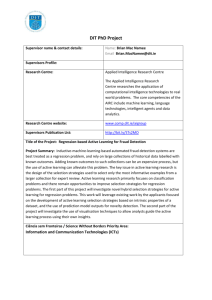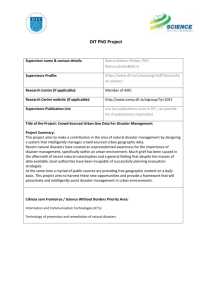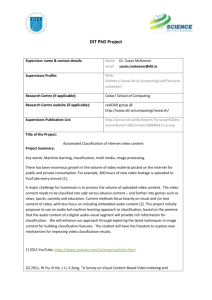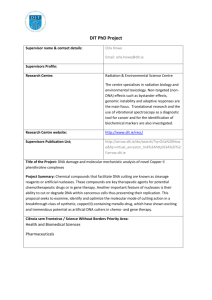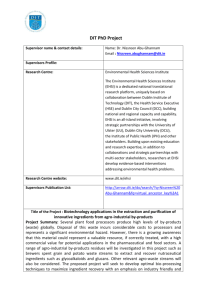Expanding Education Horizons*
advertisement
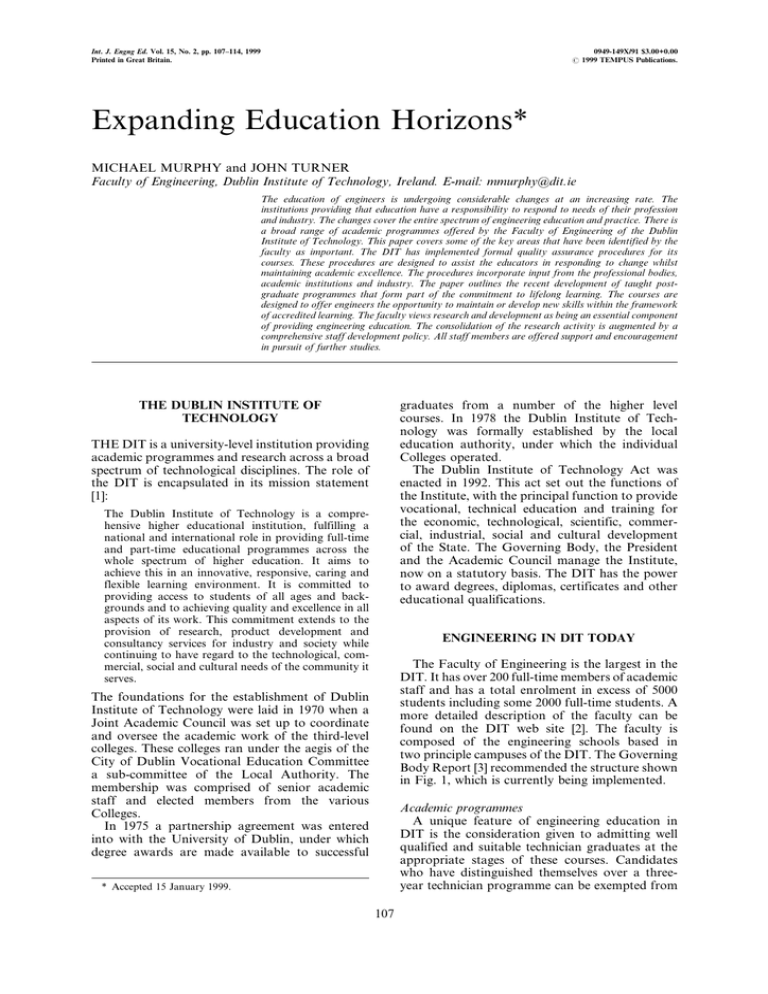
Int. J. Engng Ed. Vol. 15, No. 2, pp. 107±114, 1999 Printed in Great Britain. 0949-149X/91 $3.00+0.00 # 1999 TEMPUS Publications. Expanding Education Horizons* MICHAEL MURPHY and JOHN TURNER Faculty of Engineering, Dublin Institute of Technology, Ireland. E-mail: mmurphy@dit.ie The education of engineers is undergoing considerable changes at an increasing rate. The institutions providing that education have a responsibility to respond to needs of their profession and industry. The changes cover the entire spectrum of engineering education and practice. There is a broad range of academic programmes offered by the Faculty of Engineering of the Dublin Institute of Technology. This paper covers some of the key areas that have been identified by the faculty as important. The DIT has implemented formal quality assurance procedures for its courses. These procedures are designed to assist the educators in responding to change whilst maintaining academic excellence. The procedures incorporate input from the professional bodies, academic institutions and industry. The paper outlines the recent development of taught postgraduate programmes that form part of the commitment to lifelong learning. The courses are designed to offer engineers the opportunity to maintain or develop new skills within the framework of accredited learning. The faculty views research and development as being an essential component of providing engineering education. The consolidation of the research activity is augmented by a comprehensive staff development policy. All staff members are offered support and encouragement in pursuit of further studies. graduates from a number of the higher level courses. In 1978 the Dublin Institute of Technology was formally established by the local education authority, under which the individual Colleges operated. The Dublin Institute of Technology Act was enacted in 1992. This act set out the functions of the Institute, with the principal function to provide vocational, technical education and training for the economic, technological, scientific, commercial, industrial, social and cultural development of the State. The Governing Body, the President and the Academic Council manage the Institute, now on a statutory basis. The DIT has the power to award degrees, diplomas, certificates and other educational qualifications. THE DUBLIN INSTITUTE OF TECHNOLOGY THE DIT is a university-level institution providing academic programmes and research across a broad spectrum of technological disciplines. The role of the DIT is encapsulated in its mission statement [1]: The Dublin Institute of Technology is a comprehensive higher educational institution, fulfilling a national and international role in providing full-time and part-time educational programmes across the whole spectrum of higher education. It aims to achieve this in an innovative, responsive, caring and flexible learning environment. It is committed to providing access to students of all ages and backgrounds and to achieving quality and excellence in all aspects of its work. This commitment extends to the provision of research, product development and consultancy services for industry and society while continuing to have regard to the technological, commercial, social and cultural needs of the community it serves. ENGINEERING IN DIT TODAY The Faculty of Engineering is the largest in the DIT. It has over 200 full-time members of academic staff and has a total enrolment in excess of 5000 students including some 2000 full-time students. A more detailed description of the faculty can be found on the DIT web site [2]. The faculty is composed of the engineering schools based in two principle campuses of the DIT. The Governing Body Report [3] recommended the structure shown in Fig. 1, which is currently being implemented. The foundations for the establishment of Dublin Institute of Technology were laid in 1970 when a Joint Academic Council was set up to coordinate and oversee the academic work of the third-level colleges. These colleges ran under the aegis of the City of Dublin Vocational Education Committee a sub-committee of the Local Authority. The membership was comprised of senior academic staff and elected members from the various Colleges. In 1975 a partnership agreement was entered into with the University of Dublin, under which degree awards are made available to successful Academic programmes A unique feature of engineering education in DIT is the consideration given to admitting well qualified and suitable technician graduates at the appropriate stages of these courses. Candidates who have distinguished themselves over a threeyear technician programme can be exempted from * Accepted 15 January 1999. 107 108 M. Murphy and J. Turner Fig. 1. Faulty of Engineering structure. the first two years of a related degree-level course. Significantly, students who are admitted each year on this basis often perform well when compared with the direct entry students who are selected on a competitive Leaving Certificate entry `points' system through the Central Applications Office (CAO). The pathway of academic progression is shown in Fig. 2. . . . . . . . . Degree courses The faculty places a high emphasis on professional recognition and accordingly all engineering degree courses are recognised by the Institution of Engineers of Ireland as satisfying the academic requirement for professional membership. These courses have duration of four years full-time study and are currently offered in the following disciplines: Normally 200 students are admitted each year at degree level. They follow the common first year course offered by each Campus and there are common core elements in the subsequent years. The DIT has a national appeal with over 55% of entrants from outside the greater Dublin area [4]. In recent times the number of overseas students has increased sharply. The DIT provides some 15% Mechanical Engineering Electrical Engineering Manufacturing Engineering Electronic Engineering Structural Engineering Computer Engineering Building Services Engineering Telecommunications Engineering. Expanding Education Horizons MSc 109 M Phil/PhD Taught By research Postgraduate Final Year Degree Third Year Degree Third Year Diploma Second Year Degree Second Year Certificate First Year Degree First Year Certificate Preliminary Engineering Leaving Certificate entry or equivalent Higher Level Course Ordinary Level Course Fig. 2. Academic progression. of primary degree graduates in Engineering in Ireland. Technician courses The Institute offers a range of Technician Courses, some of which extend over three years, while others are organised on a Certificate/ Diploma structure. Students are awarded a Certificate after two years of study. Those students who perform well in these examinations are able to move to the Diploma stage. The total number of students who enter engineering courses each year is 350. These courses cover the following disciplines: . . . . Mechanical Engineering Civil Engineering Municipal Engineering Electronic Systems . . . . . . . Electrical and Control Engineering Telecommunications Engineering Building Services Engineering Industrial Electronic Systems Transport Management Electrical and Electronic Draughting Applied Electronics (Communications Engineering) . Industrial Electronic Systems. At technician level DIT provides more than 20% of the total full-time graduate awardees in Ireland. The graduates are eligible for associate membership of the Institution of Engineers of Ireland. Postgraduate education The Faculty of Engineering places an emphasis on continuing professional education and has offered various programmes in partnership with 110 M. Murphy and J. Turner the professional bodies, educational institutes and industry over the years. These programmes have evolved into a suite of courses covering the full range of academic activity. As part of these developments, the faculty offers both taught and research postgraduate awards. The taught programs have been developed to provide innovative and focused courses for graduates. The programmes are modular in format, allowing a student to take an individual module if required. The programme can be delivered in both fulltime and part-time modes. Students may opt for the Postgraduate Diploma, which is awarded for completing only the taught modules. The MSc is awarded when the student completes a research dissertation in addition to the taught elements. The entry requirements for the courses are; a second-class honours degree in engineering or equivalent or full membership of a recognised professional body or a qualification or combination of qualifications deemed by the Institute as being of equivalent standard, when taken in conjunction with relevant work experience. The admissions board comprising the head of postgraduate studies, course director and an academic member, will assess applicants that do not meet the normal entry requirements. The structure of these programs is the same as the M.Sc. in Applied Computing which is shown as follows in Table 1. Each taught MSc programme has the same structure and each module is designed as a discrete entity that may be taken as a single subject. The modules have the ECTS credit rating [5]. This design facilitates the delivery of the program in full and part-time modes. It also offers greater flexibility in updating or developing new module options. The programmes currently offered are as follows. . M.Sc. in Applied Computing for Technologists. The students take the following modules: Operating systems, Networks and Communications, Software Engineering, Information Systems, Numerical Methods, Computer-Aided Design, Image Processing and Graphics. . M.Sc. in Engineering Computation. The taught modules are: Operating Systems, Networks and Communications, Engineering Software Design, Information Systems, Numerical Methods, Engineering Design, Engineering Analysis. . M.Sc. in Information Technology Engineering. There are six taught modules: Communications Engineering, Telecommunications Networks and Transmission Systems, Computer Networks and Data Communications, Advanced Computer Engineering, Software Design for Communications Systems, Project Management. Future developments A faculty-wide taught M.Sc. programme is currently being developed and will be offered in 1999. This programme will have a similar modular format to the existing programmes and will cover a wide range of engineering subjects. It is designed to allow the engineer to select the appropriate taught modules to enhance their knowledge of particular engineering disciplines. The focus of the research project should reflect the student's background, the modules completed and the professional requirements of the student. The faculty is also exploring international links in relation to its courses. Discussions are under way with a European Union University network to examine how engineering postgraduates may have the opportunity to take modules or carry out research in other universities. Graduate output Table 2 shows the number of graduates with DIT awards for the various courses for 1998 from the Faculty of Engineering. SPECIAL FEATURES OF DIT COURSES Academic progression Special attention has been given to developing educational opportunities that enable the better students to progress from certificate to diploma or degree levels. This adds an important dimension to the higher level courses by having a broader mix of students with different backgrounds, including some with significant work experience. It promotes a better appreciation of the expertise and skills of the different categories of engineering personnel across the faculty, reflecting what is found in Table 1. Modules 1 Operating Systems, Networks & Communications 2 Software Engineering 3 Information Systems 4 Numerical Methods 5 Computer-Aided Design 6 Image Processing & Graphics Dissertation Total Credits Lecture hours Tutorial hours Laboratory hours Study hours 10 60 20 50 75 10 10 10 10 10 30 90 60 60 60 60 60 40 20 20 20 20 40 180 75 50 25 50 50 200 500 75 75 75 75 75 300 650 360 Expanding Education Horizons Table 2. Level of award Number of graduates Certificate/Diploma Degree Postgraduate 381 175 16 industry. The DIT offers progression through all levels of engineering education. Part-time education A particular feature of the Institute's engineering course provision is the special commitment it has to part-time education. Where feasible, DIT awards are offered on a part-time basis to students. This enables students to start or continue their education whilst remaining in employment. The courses range from technician certificates/diplomas to professional degree and postgraduate awards. The students take the same examinations and assessments as their full-time counterparts. The high level performance of mature students has always been a feature of these programmes. At present a student may attain Certificate/ Diploma award after five to six years of parttime study. The faculty is examining new and innovative ways of delivering part-time technological education using such multimedia technology, distance learning and on-site learning. The purpose of these innovations is to provide the student with a better learning experience, higher academic achievement and an accelerated study path. It is not unusual for students to return to the faculty for further study after graduation. Quality assurance The DIT has a quality assurance policy in place [6]. The primary objective of the policy is to ensure the appropriate level of academic standard, resource availability and relevance of all courses. The policy involves a standard set of procedures that are applied to all courses throughout the DIT. A course committee involving all lecturing staff meets regularly each term to monitor the course and deal with any issues that arise. As part of this policy the Institute also arranges for a periodic major review of all programmes, typically every five years, with the assistance of expert external panels of similar composition. The quality assurance policy is summarised in Table 3. Academic quality assurance procedures are brought into play at three stages in the life cycle of a course. 1. From the initial stage of course design, the Institute has established procedures for proposing, planning, internal approval, and validation involving external and internal peer judgement. These stages are illustrated in Fig. 3. 2. Within the annual running cycle of the course there are procedures for course improvement, examinations/assessments monitored by external examiners and possibly by professional bodies, Annual Report on the course involving performance indicators, feedback from students, feedback from employers and public and private bodies, staff professional development, including training in advanced teaching and other methodologies. 3. Every five years a detailed internal critical selfstudy of the course and its operation is undertaken followed by a review involving external and internal peer judgement and approval. Internal evaluations of quality and standards are regularly subjected to peer judgements by external examiners, external academic advisers, professional bodies and other relevant organisations, so as to reinforce the integrity of internal decisionmaking on matters of quality and academic standards. An Annual Report on the operation of each course for the previous session is prepared by the course committee in order to provide feedback on academic quality assurance for each course. The annual report is submitted to the Faculty Board at the start of each session for evaluation and forwarded to Academic Council for further consideration. Table 3. Course cycle Course planning and design Teaching, learning and assessment Student issues Key issues . . . . . . . . . . . . . . 111 market testing and evidence of demand for programmes curriculum design, content, innovation and organisation internal course approval and review procedures external validation procedures management of courses allocation of staff resources assessment of relevance and effectiveness of programmes external examiners strategy, policies, implementation and evaluation admissions procedures equity and equality of opportunity access issues, student progress and achievement student appeals system involvement of students in evaluation procedure support systems for students 112 M. Murphy and J. Turner Fig. 3. Quality assurance procedures. Staff development The staff of the DIT is the single most important resource of the Institute [7]. The staff have access to resources and facilities to enable them to develop and expand their knowledge, skills and qualifications so that they may realise their full potential in relation to the evolving needs of the Institute, professional development and their own career development. All full-time academic staff members are encouraged to pursue higher degrees in their area of expertise. The Staff Development Committee coordinates and monitors staff development. The DIT provides support in the form of tuition fee support, study and examination leave, participation in external conferences and seminars and through the provision of customised short courses. A fulltime staff development officer has been appointed to coordinate staff development activity with the faculties. The primary objective is to provide support in a practical and effective manner to the individuals and schools as required. The DIT currently provides support under the following initiatives: . Fee support. Staff members who are pursuing relevant postgraduate awards such PhDs or MSc's in other Universities are provided with assistance for fees and examination costs. . Short courses. The Staff Development Office coordinates the delivery of short courses in particular areas in conjunction with the academic management. The courses cover areas such as Information Technology to highly specialised new laboratory procedures. . Training for trainers M.Sc. programmes. The DIT is participating with other institutes in Ireland in providing a taught M.Sc. programme to academic and technical staff in particular areas of new technology. The programme areas are Computing, Education Management, Advanced Engineering, Science, Business & Enterprise and Multimedia. . Conference support. Staff members who are presenting papers at national/international conferences are also provided with financial assistance. . Fee waivers. A full-time academic staff member is granted a waiver if fees of they are pursuing an internal DIT programme. STRATEGY FOR DEVELOPMENT OF RESEARCH The Institute as part of its mission positively promotes research and development activities. Section 5.1 (e) of the DIT Act requires DIT `to engage in research, consultancy and development work and to provide such services in relation to these matters as the Governing Body considers appropriate Special budgetary provision has been made to support research centres' [8]. In addition, Expanding Education Horizons the schemes listed below have been made available to promote research within the Institute. Considerable progress has been made in facilitating and encouraging members of staff to engage in research and take on postgraduate students to become involved in this work. The Institute's policy is to foster and encourage in every way possible the strong research ethos that is developing in various areas. As may be seen from The Review of Research and Development Projects in DIT there are currently about 200 postgraduate research students and other research assistants in the Institute [9]. Since 1993 the Institute has initiated and developed a number of funding schemes to encourage and facilitate staff members engaging in research. These include the following: . DIT/TCD joint seed funding scheme. This is a programme jointly administered by DIT and Dublin University. Its objective is to encourage cooperation in research areas of mutual interest. It provides funding to the academics to initiate research projects. The funding is offered on a competitive basis to project teams drawn from both institutions. . DIT seed funding scheme. The purpose of this programme is to provide initial support for embryonic research proposals. The objective is to allow the staff member to develop an idea into a formal research project that may attract external funding. Provision is made for amounts of up to £4,000 per project to be allocated for such proposals. This scheme is available to the academic staff to support their work in developing research projects. The funding may be used in acquiring specific equipment, travel and the employment research assistance. . Postgraduate scholarships. The scholarship scheme has been established for postgraduate students working under the direction of DIT research supervisors. Thirty-two such scholarships of two years duration are provided in the academic year across the faculties of the institute. This programme provides the opportunity for a suitably qualified student to pursue a higher degree within the institute. The researcher is employed on a full-time basis by the institute and is supervised by the staff member concerned. . Post-doctoral fellowships. A post-doctoral fellowship scheme was introduced in 1996. This scheme provides funding for a senior researcher and for resources. The proposed initial recruitment was six fellows and one of these was appointed to the faculty. . Strategic Research and Development Programme (SRD). Since 1990, with the support of the Department of Education, the Institute has administered a Strategic Research and Development (SRD) Programme which supports 64 postgraduate researchers annually, working on projects with a strong industrial involvement. In 113 the management of this extensive programme, the Institute has adopted the approach of providing a strong management, with local managers at each school coordinating the work of the individual research supervisors. A range of appropriate course modules, seminars and lectures are organised for the postgraduate students and research supervisors, to advance the research work, ensure its quality and relevance to industry and in general foster a dynamic research ethos across the Institute. This programme is now in its eighth year of operation. Product development Another aspect has been the focus of special attention in recent times is providing assistance for engineering students to develop their entrepreneurial talents and skills. This is achieved through the inclusion of appropriate business and management topics in their courses and encouraging them to give due emphasis to the wider economic aspects in their project work. If project ideas are considered to have prospects of becoming commercially viable, then their initiators are encouraged to use the facilities of the DIT Project and Product Development Centre at Herbert Street where continuing assistance and support is provided for a period of at least twelve months. Research centres Following the success of the Project Development Centre, the Institute developed a policy and strategy of forming research centres, with sufficient critical mass to provide solid continuity in research work and funding. These have usually been formed around researchers with a proven track record, and have been designed to enhance and assist the research effort of the Institute, thus enabling centres to compete for major research funding in the future, and become self-financing where possible. The first of these centres, the DIT National Avionics Centre in DIT Kevin Street, was formally established early in 1995 as National Avionics Ltd., the first DIT Campus Company. The DIT was successful in obtaining funding for other centres that are associated with the faculty: . Timber Technology Centre, Bolton Street . Building Information Centre, Bolton Street . The National Satellite Services Centre, Kevin Street . National Maintenance Centre, Bolton Street . The Industrial Control Centre, Kevin Street . The Applied Optoelectronics Centre, Kevin Street . Flexible Manufacturing Centre, Bolton Street. A full-time manager is appointed to each centre to ensure that industry obtains a professional service from the centre. Most of the centres have been assisted in their initial phase by state agencies such as Forbairt drawing on EU funds but they 114 M. Murphy and J. Turner are encouraged to earn income as soon as possible for the services they are providing. Each centre has an advisory board with strong industrial membership. CONCLUSIONS The Faculty of Engineering in keeping with other similar institutions is preparing itself for the challenges of the modern technological society. We are currently addressing important issues affecting engineering education. Consideration is currently being given to developing a range of new programmes, some of an inter-disciplinary nature, to prepare young people for emerging specialisations and geared to the needs of modern industry and professional practice. We are committed to creating an inclusive approach to engineering education. It is committed to removing artificial barriers to participation in engineering education. In keeping with its long tradition in providing access and progression at all levels in engineering education, it aims to provide further education programs to allow greater participation from particular groups. We are looking at new models for part-time education. We are experiencing significant changes in profiles and interests of part-time students. We are examining methods of providing progression for students who have acquired non-standard awards and experiential learning. Pilot projects are under way to examine new methods of course delivery. The applicability of distance learning, Web-based learning and computer-aided instruction is being examined in the context of engineering education. The objectives are to provide greater access for a greater number of students. The use of new technologies will bring engineering education to a wider number of students of varying backgrounds. The concept of lifelong learning is being applied to our existing programmes and to those under development. It is intended to develop and consolidate this feature through all activities of the faculty. This will be done in course design, research work and through industrial links. The implementation of European Credit Transfer System (ECTS) will assist in this policy. The DIT has a major input into the education of engineering graduates at all levels in Ireland. There are many important current issues involving the education of engineers. New technologies and design methodologies are continuously redefining the role of engineers in our society. It is essential that the faculty is at the forefront of such changes and ensures that professional, ethical and educational needs of engineers remain the primary concern of the faculty. REFERENCES 1. 2. 3. 4. 5. 6. 7. 8. 9. DIT Annual Report, (1993/94). http://www.dit.ie/ (1998). Academic Structures for DIT, Governing Body Report, (1997). Clancy Patrick, Access to College: Patterns of Continuity & Change, HEA, 1995. ECTS Brochure, Bureau d'Assistance Technique Socrates et Jeunesse, ERASMUS (1996). Quality Assurance Handbook, Dublin Institute of Technology, 1995. Staff Development Policy, Dublin Institute of Technology, 1998. Dublin Institute of Technology Act, Rialtas nah Eireann, 1992. The Review of Research and Development Projects in DIT (1995). Michael Murphy is the Deputy Director of the Faculty of Engineering in DIT. He is a graduate in Mechanical Engineering from the DIT and holds a Master's degree from Dublin University. He gained extensive industrial experience as a production engineer before joining the staff. He is a past chairman of the Academic Council. He has contributed extensively to the development of the research programmes in the DIT and has been the project manager of several EU funded projects. John Turner is the Head of Computing in the Faculty of Engineering. He is a graduate of Civil Engineering from University College Dublin (1980) and is the holder of a M.Eng.Sc. (1982) award from the same university. He joined the DIT in 1984 after working with the Electricity Supply Board in Ireland. He is chairperson of the Course Board for the taught postgraduate programme for the faculty. He has been extensively involved in the application of information technology to environmental engineering and has supervised several postgraduate students in this area.
